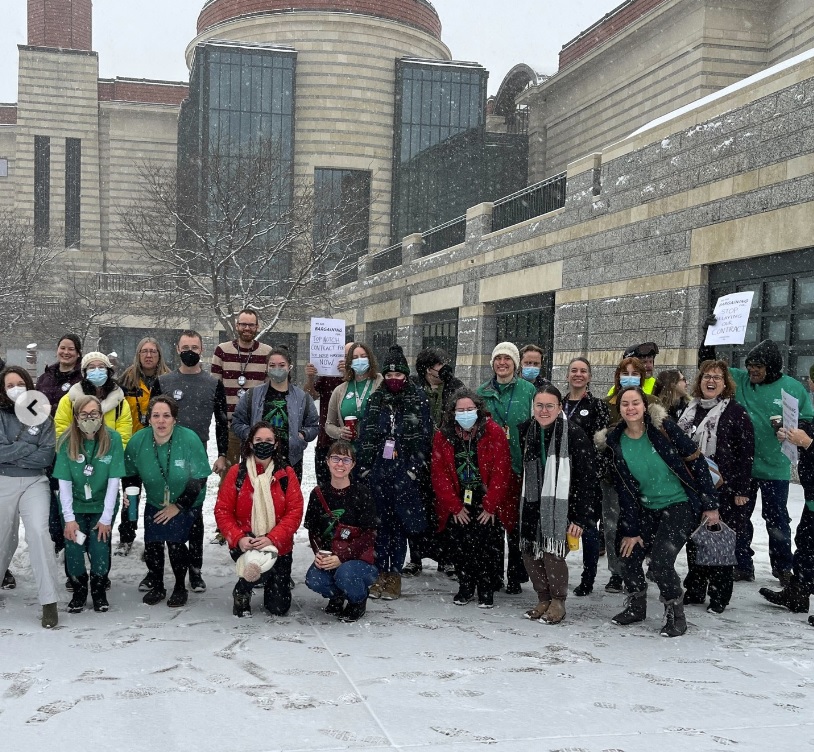When workers present employers with their intent to unionize, things can go two ways—one easy, one hard. Management can voluntarily recognize the new union, thus removing all sorts of contentious hullabaloo. Or, more often, the bosses can pay lip service to the legally documented right of workers to unionize, but stress that, in their company, that dynamic would upset the applecart.
On September 1 of 2021, when around 300 workers at the Minnesota Historical Society alerted management of their freshly formed union, they heard crickets.
“We didn’t receive any direct response," says Molly Jessup, a MNHS program specialist and president of the union. Eventually the workers heard back, with MNHS leaders saying that they “didn’t think it was the right thing” for their taxpayer subsidized nonprofit organization, Jessup remembers.
Under the umbrella of AFSCME Council 5, a union that represents around 43,000 Minnesotans, MNHS workers rallied ahead of a November unionization vote overseen by National Labor Relations Board. Management contested whether a group of employees designated as “temporary” were eligible to vote, Jessup says. The union successfully pushed back, citing the fact that some of those workers had been employed for “five years, six years, in one case 30 years,” she adds; a wonky quirk related to position funding resulted in the temporary label. On November 17 of '21, the election results went public: 144 worker votes for the union, 63 against it, and 48 ballots challenged or voided. MNHS had officially become a union shop.
Like in so many other industries, the pandemic had exposed long-simmering worker grievances at MNHS, which operates St. Paul's Minnesota History Center and 20+ other sites around the state. Among them: pay equity, living wages, paid parental leave, staff retention, and more of a voice in the workplace.
“Wages have been really low, and they’ve been really stagnant. One of the No. 1 things that’s important to our colleagues is to be able to afford to work for MNHS," Jessup says. "We don’t believe any person working a full-time job should be housing or food insecure.”
Addressing those issues at the bargaining table has been met with "heel-dragging, defensiveness, and indifference" from the company, she says. The union had hoped to hammer out a contract by the end of the year, but that's looking less and less likely. The dragged-out negotiations have spurred the union toward public-facing actions: They're staging a fair contract rally December 17 outside MNHS HQ; Jessup encourages sympathetic members of the public to reach out to the company with pro-union messages.
“Like a lot of other nonprofits, you get this message as an employee, that you’re so fortunate to have this job, the mission is so important, nobody should be asking for more than the bare minimum," the union president says. "But we do believe we deserve more than the bare minimum. As an employee you want to know that you are valued and respected, and we certainly haven’t always felt that way in negotiations. We’re not seeing a spirit of collaboration.”
In a statement to Racket, MNHS CEO Kent Whitworth says that the two sides "have made significant progress" since negotiations began in June, adding that MNHS had hoped to begin talks sooner but the union was not ready until mid-May.
"Bargaining an initial contract takes time. It takes an average of 465 days for unions and employers to ratify their first contract, according to Bloomberg Law," he continues. "This is a nuanced negotiation because of the complexity and size of MNHS’s workforce, which extends throughout the state of Minnesota. We respect the process and are working toward a common goal of reaching a fair contract. Our team looks forward to continuing to negotiate with the union in good faith as it has throughout this entire process.”
Members of the union are quick to point out that their average hourly wage ($21.05) is somewhat lower than Whitworth's ($131.24), and that 48% of MNHS workers make less than what's considered a living wage in the Twin Cities ($18.20). A significant number of staffers are eligible for food stamps, Jessup reports.
While the base levels of Maslow's famous pyramid are front of mind for MNHS workers, Jessup says that—true to her organization's core mission—workers are mindful of the historical precedent their labor battle will set.
“People in the state of Minnesota entrust us to take care of important objects, papers, buildings, places, and stories for the next generation," she says. "For us, as workers, this isn’t just a matter of ourselves right now, but also who’ll come after us and work for the Historical Society. How do we set them up to be successful?”






